|
ITALIANO |
|
|

|

|

|
|
|
.
|
|
|
ITALIANO ENGLISH ESPAÑOL
FRANÇAIS
|
|
|
GANDHI
UN
UOMO DA SEGUIRE |
| . |
|
|
|
|
|
| . |
|
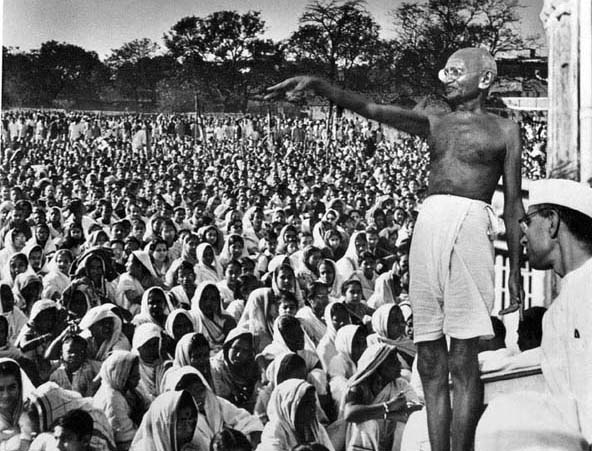
|
|
| . |
|
|
| . |
|
|
|
BIOGRAFIA |
|
| . |
|
|
|
Mohandas
Karamchard Gandhi, detto il Mahatma
(soprannome datogli dal poeta indiano R.Tagore che in sanscrito
significa “Grande Anima”), è il fondatore della nonviolenza e il
padre dell’indipendenza indiana.
Nasce a
Portbandar in India il 2 ottobre 1869. Dopo aver studiato nelle
università di Ahmrdabad e Londra ed essersi laureato in giurisprudenza,
esercita brevemente l’avvocatura a Bombay.
Nel 1893
si reca in Sud Africa con l’incarico di consulente
legale per una ditta indiana e vi rimane per 21 anni. Qui si scontra con
una realtà terribile, in cui migliaia di immigrati indiani sono vittime
della segregazione razziale. L’indignazione per le discriminazioni
razziali subite dai suoi connazionali (e da lui stesso) da parte delle
autorità britanniche, lo spingono alla lotta politica. Il Mahatma si
batte per il riconoscimento dei diritti dei suoi compatrioti e dal 1906
lancia, a livello di massa, il suo metodo di lotta basato sulla resistenza
nonviolenta- “satyagraha”:
una forma di non-collaborazione radicale con il governo britannico,
concepita come mezzo di pressione di massa. Gandhi giunge
all’uguaglianza sociale e politica tramite le ribellioni
pacifiche e le marce. Alla fine, infatti, il governo sudafricano attua
importanti riforme a favore dei lavoratori indiani (eliminazione di
parte delle vecchie leggi discriminatorie, riconoscimento ai nuovi
immigrati della parità dei diritti e validità dei matrimoni
religiosi).
Nel 1915
Gandhi torna in India, dove circolano già da tempo
fermenti di ribellione contro l’arroganza del dominio britannico (in
particolare per la nuova legislazione agraria, che prevedeva il
sequestro delle terre ai contadini in caso di scarso o mancato raccolto,
e per la crisi dell’artigianato). Egli diventa il leader del Partito
del Congresso, partito che si batte per la liberazione dal colonialismo
britannico.
- 1919: prima
grande campagna satyagraha di disobbedienza civile, che
prevede il boicottaggio delle merci inglesi e il non-pagamento delle
imposte. Il Mahatma subisce un processo ed è arrestato.
- 1921: seconda
grande campagna satyagraha
di disobbedienza civile per rivendicare il diritto
all’indipendenza. Incarcerato, rilasciato, Gandhi partecipa alla
Conferenza di Londra sul problema indiano, chiedendo l’indipendenza
del suo paese.
- 1930: terza
campagna di resistenza. La marcia del sale: disobbedienza contro la tassa sul sale (la
più iniqua perché colpiva soprattutto le classi povere). La campagna
si allarga con il boicottaggio dei tessuti provenienti dall’estero. Gli inglesi arrestano Gandhi,
sua moglie e altre 50.000 persone.
Spesso
incarcerato negli anni successivi, la “Grande Anima” risponde agli
arresti con lunghissimi scioperi della fame (importante è quello che
egli intraprende per richiamare l’attenzione sul problema della
condizione degli intoccabili, la casta più bassa della società
indiana).
All’inizio
della Seconda Guerra Mondiale, Gandhi decide di non sostenere
l’Inghilterra se questa non garantisce all’India l’indipendenza.
Il governo britannico reagisce con l’arresto di oltre 60.000
oppositori e dello stesso Mahatma, che è
rilasciato dopo due anni.
Il 15
agosto 1947 l’India conquista l’indipendenza.
Gandhi, però, vive questo momento con dolore, pregando e digiunando. Il
subcontinente indiano è diviso in due stati, India e Pakistan, la cui
creazione sancisce la separazione fra indù e musulmani e culmina in
una violenta guerra civile che costa, alla fine del 1947, quasi un
milione di morti e sei milioni di profughi.
L’atteggiamento
moderato di Gandhi sul problema della divisione del paese suscita
l’odio di un fanatico indù che lo uccide il 30 gennaio 1948,
durante un incontro di preghiera.
|
| . |
|
|
| . |
|
|
|
IL PENSIERO |
|
| . |
|
|
|
Il
pensiero di Gandhi si
basa su tre punti fondamentali:
- Autodeterminazione
dei popoli:
Gandhi riteneva fondamentale il fatto che gli indiani potessero
decidere come governare il loro paese, perché la miseria nella
quale si trovava dipendeva dallo sfruttamento delle risorse da parte
dei colonizzatori britannici.
- Nonviolenza: è necessario precisare che tale precetto non si ferma ad una
posizione negativa (non essere causa di male agli altri) ma possiede
in sé la carica positiva della benevolenza universale e diventa
l’”amore puro” comandato dai sacri testi dell’Induismo, dai
Vangeli e dal Corano. La nonviolenza è quindi un imperativo
religioso prima che un principio dell’azione politico-sociale.
Il Mahatma rifiuta la violenza come strategia di lotta in quanto la
violenza suscita solamente altra violenza. Di fronte ai violenti e
agli oppressori, però, non è passivo, anzi. Egli propone una
strategia che consiste nella resistenza passiva, il
non reagire, in altre parole, alle provocazioni dei violenti, e
nella disobbedienza civile, vale a dire il rifiuto di
sottoporsi a leggi ingiuste.
“La mia non-cooperazione non nuoce a nessuno; è non-cooperazione
con il male,… portato a sistema, non con chi fa il male”.
·
Tolleranza
religiosa:
”… il mio più intimo desiderio” dice
Ghandhi “… è di realizzare la fratellanza … tra tutti gli uomini,
indù, musulmani, cristiani, parsi e ebrei” (M.K.Gandhi, Gandhi
Parla di Se Stesso, p.83). Gandhi sognava la convivenza pacifica e
rispettosa dei tantissimi gruppi etnici e delle diverse professioni
religiose presenti in India. Queste erano delle ricchezze che dovevano
convivere e non dividere politicamente la nazione. Purtroppo, gli eventi
non andarono come sperava Gandhi.
|
| . |
|
|
| . |
|
|
|
IL MESSAGGIO |
|
| . |
|
|
|
Il
messaggio
che il Mahatma ci lascia è molto attuale e la storia contemporanea,
purtroppo, continua ad essere macchiata dalla guerra e dalla violenza.
Gandhi,
“piccolo grande uomo”, riesce con le sue sole forze, a sconfiggere
il potente Impero britannico e a realizzare il suo grande sogno
dell’indipendenza per il suo paese. Come?
Con la forza sbalorditiva della nonviolenza, del boicottaggio pacifico,
della resistenza passiva e della ricerca della Verità (Dio).
Come
possiamo rendere attuale Gandhi? Come possiamo essere anche noi
portatori di pace?
Gandhi
dimostra che la forza di un singolo uomo può diventare la forza di un
popolo intero. Non dobbiamo quindi disperare se ci sembra che poteri
superiori vogliano decidere per noi e armarci la mano. Gandhi stesso, con le sue parole, ci incoraggia a “cercare
… la propria strada e … seguirla senza esitazioni”
e a “non avere paura”.
Rivolgendosi a ciascuno di noi aggiunge: “…affidati alla
piccola voce interiore che abita il tuo cuore e che ti esorta ad
abbandonare …, tutto, per dare la tua testimonianza di ciò per cui
hai vissuto e di ciò per cui sei pronto a morire” (The
Bombay Chronicle, 9 agosto 1942).
Il
precetto della seguente strofa didattica di Gajarati – rispondere
al male con il bene
– fu il principio guida di Gandhi:
“Per
una scodella d’acqua,
rendi
un pasto abbondante;
per un
saluto gentile,
prostrati
a terra con zelo;
per un
semplice soldo,
ripaga
con oro;
se ti
salvano la vita,
non
risparmiare la tua.
Così
parole e azione del saggio riverisci;
per
ogni piccolo servizio,
dà un
compenso dieci volte maggiore:
Chi è
davvero nobile,
conosce
tutti come uno solo
e rende
con gioia bene per male”.
|
|
. |
|
LE
FRASI DI GANDHI
ENTER |
|
.
. |
|

|
| .
.
. |
|
|
|
ENGLISH
|
|

|
| . |
|
GANDHI
A
MEN TO FOLLOW
|
|
| . |
|
|
| . |
|
|
| . |
|
|
|

|
|
| . |
|
|
|
BIOGRAPHY
|
|
| . |
|
|
|
Mohandas
Karamchard Gandhi, says the Mahatma (nickname given him by the Indian poet
R.Tagore that in sanscrito it means" Great Soul"), it is the
founder of the no-violence and the father of the Indian independence.
It
is born to Portbandar in India October 2 nd 1869. After having studied in
the universities of Ahmrdabad and London and to be him graduate in
jurisprudence, shortly practices the advocacy to Bombay.
In
1893 it brings him in South Africa with the charge of Counsel for an
Indian firm and he/she remains you for 21 years. Here meet him with a
terrible reality, in which thousand of Indian immigrants are victims of
the apartheid. The indignation for the race discriminations suffered by
his/her fellow countrymen (and from himself) from the British authorities,
they push him/it to the political struggle. The Mahatma fights for the
recognition of the rights of his/her fellow citizens and from the 1906
lance, to level of mass, his/her method of struggle founded on the
resistance no-violence -" satyagraha": a form of radical
not-collaboration with the British government, conceived as mean of
pressure of mass. Gandhi reaches the social equality and politics through
the pacific rebellions and the marches. At the end, in fact, the
government African
south effects important reforms for the Indian workers (elimination of part of
the old discriminatory laws, recognition to the new immigrants of the
parity of the rights and validity of the religious marriages).
In
the 1915 Gandhi it returns in India, where they circulate for a long time
already ferments of rebellion against the arrogance of the British
dominion (particularly for the new agrarian legislation, that foresaw the
sequestration of the earths to the farmers in case of scarce or missed
picked, and for the crisis of the craftsmanship). He becomes the leader of
the Party of the Congress party that fights for the liberation from the
British colonialism.
-
1919: first great country satyagraha of civil disobedience, that foresees
the boycotting of the commodities English and the not-payment of the taxes.
The Mahatma suffers a trial and you/he/she is arrested.
-
1921: second great country satyagraha of civil disobedience to vindicate
the right to the independence. Incarcerated, released, Gandhi participates
in the Lecture in London on the Indian problem, asking the independence of
his/her country.
-
1930: third country of resistance. The salt's
march: disobedience against the tax on the salt (the most iniquitous
because it struck above all the poor classes). The country
widens with the boycotting of the fabrics coming from the foreign
countries. The English arrest Gandhi, his/her wife and other 50.000
people.
Often
incarcerated in the following years, her" Great Soul" he/she
answers to the arrests with long hunger strikes (important it is what he
undertakes for recalling the attention on the problem of the condition of
the untouchable ones, the lowest caste of the Indian society).
To
the beginning of the Second World war, Gandhi decides not to sustain
England if this doesn't guarantee to India the independence. The British
government reacts with the arrest of over 60.000 opponents and of the same
Mahatma, that is released after two years.
August
15 th 1947 India conquers the independence. Gandhi, however, alive this
moment with pain, praying and fasting. The Indian subcontinent is
separated in two states, India and Pakistan, whose creation enacts the
separation between Hindu and Moslems and culminates in a violent civil war
that costs, at the end of 1947, almost a million corpses and six million
of fugitive.
The
moderate attitude of Gandhi on the problem of the division of the country
arouses the hate of a Hindu fanatic that kills him/it January 30 th 1948,
during a meeting of prayer.
|
|
| .
.
|
|
|
|
THE THOUGHT
|
|
| . |
|
|
| . |
The thought of Gandhi founds him on three fundamental
points:
Auto the people's determination: Gandhi held fundamental
the fact that the Indians could decide whether to govern their country,
because the poverty in which was found it depended on the exploitation of
the resources from the British colonizers.
Not violence:
it is necessary to specify that such precept doesn't stop him to a
negative position (not to be badly cause of to the others) but it
possesses in itself the positive position of the universal benevolence and
it becomes the" pure love" commanded by the sacred texts of the
Hinduism by the Gospel and by the Koran. Not
violence is therefore a religious imperative before a principle of the
political-social action. The Mahatma refuses the violence as strategy of
struggle in how much violence only arouses other violence. In front of the
violent and to the oppressors, however, it is not passive, rather. He
proposes a strategy that consists in the passive resistance, the not to
react, in other words, to the provocations of the violent, and in the
civil disobedience, or rather the refusal to undergo himself/herself/themselves
to unfair laws. "My not-cooperation doesn't harm to anybody; it is
not-cooperation with the evil. brought to system, not with whom needle the
evil."
Religious tolerance":. mines
summoned most desire" it says Ghandhi." it is to realize the
brotherhood. among all the men, Hindu, Moslems, Christians, seemed and
Hebrews" (M.K.Gandhi, Gandhi speaks of Himself, p.83).
Gandhi dreamt the pacific and respectful cohabitation of
the as ethnic groups and the different present religious professions in
India. These were of the wealths that had to cohabit and not to
politically divide the nation. Unfortunately, the events didn't go as it
hoped for Gandhi.
|
|
| .
. |
|
|
|
THE MESSAGE
|
|
| . |
|
|
|
The message that
the Mahatma allows us it is very actual and the contemporary history,
unfortunately, continuous to be stained from the war and from the violence.
Gandhi,"
small great man", he/she succeeds with his/her only strengths, to
defeat the powerful person British Empire and to realize his/her great
dream of the independence for his/her country. As? With the amazing
strength of the not violence, of the pacific boycotting, of the passive
resistance and of the search of the Truth (God).
How
can we make Gandhi actual? How can we also be us carriers of peace?
Gandhi shows that the strength of a single man can become the strength of
a whole people. We don't owe therefore to despair if it seems us that
superior powers want to decide for us and to arm us the hand. Same
Gandhi, with his/her words, it encourages us to" to look for. his/her
own road and. to follow her/it without hesitations" and to" not
to be
afraid." Turning to every of us adds":. submitted to the
small internal voice that he/she lives your heart and that it exhorts
yourself to abandon., everything, to give your testimony of this for which
you have lived and of this for which you macaws ready to die" (The
Bombay Chronicle, August 9 ths 1942).
The
precept of the following didactic strophe of Gajarati. to answer to the
evil with the good. it was the principle it drives of Gandhi:
"For a bowl of water,
you make an abundant meal;
for a kind regard,
prostrated to earth with zeal;
for a simple penny,
it repays with gold;
if they save you the life,
don't save yours.
This way words and action of the wise man you revere;
for every small service,
it gives a remuneration ten times greater:
Who is noble indeed,
it knows all as a solo
and
it makes badly well with joy for."
|
|
| . |
|
THE WORD OF GANDHI
ENTER |
| . |
|

|
|
| .
.
. |
|
|
|
ESPAÑOL
|
|
|

|
|
| . |
|
|
|
GANDHI
UN
HOMBRE DE SEGUIR
|
|
| . |
|
|
|
|
|
| . |
|
|
|

|
|
| . |
|
|
|
BIOGRAFÍA
|
|
| . |
|
|
|
Mohandas
Karamchard Gandhi, dice el Mahatma, apodo dado él del poeta indiano
R.Tagore que en sánscrito significa" Gran Alma", es el fundador
del no violencia y el padre de la independencia indiano.
Le
nace a Portbandar en India el 2 de octubre de 1869. Después de haber
estudiado en las universidades de Ahmrdabad y Londres y ser licenciado él
en jurisprudencia, practica brevemente la abogacía a Bombay.
En
el 1893 se va a Sur África con el encargo de consultor legal por una
empresa indiano y vosotros queda por 21 años. Aquí se estrella con una
realidad terrible, en cuyo millares de inmigrados indiano son víctimas de
la segregación racial. La indignación por las discriminaciones raciales
padecidas por sus connacional, y de él mismo, de parte de las autoridades
británicas, lo empujan a la lucha política. El Mahatma se bate por el
reconocimiento de los derechos a sus compatriotas y de la 1906 lanza, a
nivel de masa, su método de lucha se basado en la resistencia no viola
-" satyagraha": una forma de no-colaboración radical con el
gobierno británico, concebida como medio de presión de masa. Gandhi
llega a la igualdad social y a política por las rebeliones pacíficas y
las marchas. Al fin, en efecto, el gobierno surafricano actúa importantes
reformas a favor de los trabajadores indiano, eliminación de parte de las
viejas leyes discriminatorias, reconocimiento a los nuevos inmigrados de
la igualdad de los derechos y a validez de las bodas religiosas.
En
el 1915 Gandhi vuelve a India, dónde ya circulan desde hace tiempo
fermentos de rebelión contra la arrogancia del dominio británico, en
particular por la nueva legislación agraria, que previo el secuestro de
las tierras a los campesinos en caso de escasa o fallida cosecha, y por la
crisis de la artesanía. Él se convierte en el líder del Partido del
Congreso, partido que se bate por la liberación del colonialismo británico.
-
1919: primer grande campo satyagraha de desobediencia civil, que preve el
boicot de las mercancías inglesas y el no-pago de los impuestos. El
Mahatma padece un proceso y es parado.
-
1921: segunda gran campo satyagraha de desobediencia civil para
reivindicar el derecho a la independencia. Encarcelado, concedido, Gandhi
participa en la Conferencia de Londres sobre el problema indiano,
preguntando la independencia de su país.
-
1930: tercer campo de resistencia. La marcha
de la sal: desobediencia contra el impuesto sobre la sal, la más inicua
porque golpeó sobre todo las clases pobres. El campo se
extiende con el boicot de los tejidos procedentes del extranjero. Los
ingleses paran Gandhi, su mujer y otras 50.000 personas.
A
menudo encarcelado en los años siguientes, la" Gran Alma"
contesta a las detenciones con largas huelgas del hambre, importante es lo
que él emprende para llamar la atención sobre el problema de la condición
de los intocables, la casta más baja de la sociedad indiano.
Al
principio de la Segunda Guerra Mundial, Gandhi decide no sustentar
Inglaterra si ésta no garantiza a la India la independencia. El gobierno
británico reacciona con la detención de más de 60.000 opositores y del
mismo Mahatma, que es concedido después de dos años.
El
15 de agosto de 1947 la India conquista la independencia. Gandhi, en
cambio, vivas este momento con dolor, rogando y ayunando. El subcontinente
indiano es dividido en dos estados, India y Pakistán, cuyo creación
sanciona la separación entre hindú y musulmánes y le culmina en una
violenta guerra civil que costa, al final del 1947, casi un millón de
muertos y seis millones de prófugos.
La actitud moderada de Gandhi sobre el problema de la
división del país suscita el odio de un fanático hindú que lo mata el
30 de enero de 1948, durante un encuentro de ruego.
|
|
| .
. |
|
|
|
EL PENSAMIENTO
|
|
| . |
|
|
|
El pensamiento
de Gandhi se basa en tres puntos fundamentales:
Autodeterminación
de los pueblos: Gandhi creyó fundamental el hecho que los indianos pudieran
decidir cómo gobernar su país, porque la miseria en la que se encontró
dependió de la explotación de los recursos de parte de los colonizadores
británicos.
Non violencia:
es necesario precisar que tal regla no se para a una posición negativa, sé
no causas de mal a los otros, pero posee en si el cargo positivo de la
benevolencia universal y se convierte en l" amor puro" mandado
por los sagrados textos del hinduismo, de los Evangelios y del Alcorán. El
pacifismo es por lo tanto un imperativo religioso primero que un principio
de la acción político-social. El Mahatma rechaza la violencia como
estrategia de lucha en cuanta la violencia sólo suscita otra violencia.
Frente a los violento y a los opresores, en cambio, no es pasivo, más
bien. Él propone una estrategia que consiste en la resistencia pasiva, el
no reaccionar, en otras palabras, a las provocaciones de los violento, y
en la desobediencia civil, vale a decir el rechazo de someterse a leyes
injustas. "Mi no-cooperación no daña a nadie; es no-cooperación
con el mal. llevado a sistema, no con quien hace el dolor."
Tolerancia religiosa": el
yo más íntimo deseo" dice Ghandhi." es de realizar el
hermandad. entre todos los hombres, hindúes, musulmánes, cristianos,
parecidos y judíos" (M.K.Gandhi) Gandhi Hablado de Él Mismo, p.83.
Gandhi soñó
con la convivencia pacífica y respetuosa de los muchos grupos étnicos y
los muchas profesiones religiosas presentes en India. Éstas fueron de las
riquezas que tuvieron que convivir y no dividas políticamente la nación.
Desaforadamente, los acontecimientos no fueron como Gandhi esperó.
|
|
| .
. |
|
|
|
EL MASAJE
|
|
| . |
|
|
|
El
mensaje que el Mahatma nos deja es muy actual y la historia contemporánea,
desaforadamente, continua a ser manchada de la guerra y de la violencia.
Gandhi,"
pequeño grande hombre", logra con sus solas fuerzas, a derrotar el
potente Imperio británico y a realizar su gran sueño de la independencia
por su país. Como? Con la fuerza pasmosa del pacifismo, del boicot pacífico,
de la resistencia pasiva y de la búsqueda de la Verdad (Dios).
Cómo podemos devolver actual Gandhi? Cómo
también podemos ser nosotros portadores de paz?
Gandhi demuestra que la
fuerza de un individual hombre puede convertirse en la fuerza de un pueblo
entero. No tenemos que desesperar luego si nos parece que poderes
superiores quieran decidir por nosotros y armarnos la mano. El
propio Gandhi, con sus palabras, nos anima a" buscar. el misma calle
y. seguirla hasta indecisiones" y a" no tener miedo."
Dirigiendo a cada uno de nosotros añade":. confiados al pequeña voz
interior que habita tú corazón y que tú exhorta a abandonar., todo,
para darte testimonio de eso por que has vívido y de eso por que estás
rayo a morir", The Bombay Chronicle, el 9 de agosto de 1942.
La
regla de la siguiente estrofa didáctica de Gajarati contestar al mal con
el bien. fue el empiezo conduce de Gandhi:
"Por
una escudilla de agua,
devuelves
una comida abundante;
por un
saludo gentil,
derribados
a tierra con celo;
por un
simple duro,
recompensa
con oro;
si te
salvan la vida,
no
ahorres la tuya.
Así
palabras y acción del sabio reverencias;
por
cada pequeño servicio,
da una
remuneración diez veces mayores:
Quien es de veras noble,
conoce
todo como un solista
y
devuelve bien mal" con alegría por.
|
|
| . |
|
LAS PALABRAS DE GANDHI
ENTER |
| . |
|

|
|
| .
.
. |
|
|
|
FRANÇAIS
|
|
|

|
|
| . |
|
|
|
GANDHI
UN
HOMME À
SUIVRE
|
|
| . |
|
|
|
|
|
| . |
|
|
|

|
|
| . |
|
|
|
BIOGRAPHIE
|
|
| . |
|
|
|
Mohandas
Karamchard Gandhi dit le Mahatma, surnom donné il du poète indien
R.Tagore qu'en sanscrit il signifie" Grande Âme", c'est le
fondateur de la pas violence et le père de l'indépendance indienne.
Il
naît au Portbandar en Inde le 2 octobre 1869. Après avoir étudié dans
les universités d'Ahmrdabad et Londres et avoir attribué un titre
universitaire en droit, brièvement exploite la profession d'avocat à
Bombay.
En
1893 il se rend en Sud Afrique avec la charge de conseiller juridique pour
une maison indienne et vous il reste pour 21 ans. Il se heurte ici avec
une réalité terrible dans lequel milliers d'immigrés Indiens sont
victime de la ségrégation raciale. L'indignation pour les
discriminations raciales subies par ses compatriotes, et de lui même, de
la part des autorités britanniques, ils le poussent à la lutte politique.
Le Mahatma se bat pour la reconnaissance des droits de ses compatriotes et
de la 1906 lance, au niveau de masse, sa méthode de lutte basée sur la résistance
ne violente pas -" satyagraha": une forme de pas-collaboration
radical avec le gouvernement britannique conçue comme demi de pression de
masse. Gandhi joint à l'égalité intermédiaire social et politique les
rébellions paisibles et les marches. À la fin, en effet, le gouvernement
Africain du Sud réalise importantes réformes au service des Indiens
travailleurs, élimination de partie des vieilles lois discriminatoires,
reconnaissance aux nouveaux immigrés de l'égalité des droits et validité
des mariages religieux.
Dans
le 1915 Gandhi il revient en Inde, où ils circulent déjà depuis temps
tu fermentes de rébellion contre l'arrogance de la domination britannique,
en particulier pour la nouvelle législation agraire, qu'il prévoyait la
séquestre des terres aux paysans en cas d'insuffisant ou manqué
recueilli, et pour la crise de l'artisanat. Il devient le leader du Parti
du Congrès, parti qu'il se bat pour la libération du colonialisme
britannique.
-
1919: grande campagne premier satyagraha de désobéissance civile, qu'il
prévoit le boycottage des marchandises anglaises et le pas-payement des
impôts. Le Mahatma subit un procès et il est arrêté.
-
1921: seconde grande campagne satyagraha de désobéissance civile pour
revendiquer le droit à l'indépendance. Emprisonné, relâché, Gandhi
participe à la Conférence de Londres sur le problème indien, en
demandant l'indépendance de son pays.
-
1930: troisième campagne de résistance. La
marche du sel: désobéissance contre la taxe sur le sel, le plus inique
parce qu'il frappait les classes pauvres surtout. La campagne
s'élargit avec le boycottage des tissus provenants de l'étranger. Les
Anglais arrêtent Gandhi, sa femme et autres 50.000 gens.
Souvent
emprisonné dans les ans suivants, la" Grande Âme" répond aux
arrêts avec longues grèves de la faim, important il est celui-là qui
entreprend pour rappeler l'attention sur le problème de la condition des
parias, la caste la plus basse de la société indienne.
Au
début de la Second Guerre Mondiale, Gandhi décide de ne pas soutenir l'Angleterre
si celle-ci ne garantit pas à l'Inde l'indépendance. Le gouvernement
britannique réagit avec l'arrêt d'au-delà 60.000 opposants et du même
Mahatma, qu'il est relâché deux ans après.
Le
15 août 1947 l'Inde conquiert l'indépendance. Gandhi, cependant, vit ce
moment avec douleur, en priant et en jeûnant. Le subcontinent indien est
divisé au deux états, l'Inde et le Pakistan, elle lequel création
sanctionne la séparation entre Hindou et musulman et il culmine dans une
guerre civile violente qui coûte, à la fin de 1947, presque un million
de morts et six millions de réfugiés.
L'attitude
modérée de Gandhi sur le problème de la division du pays suscite la
haine d'un Hindou fanatique qu'il le tue le 30 janvier 1948, pendant une
rencontre de prière.
|
|
| .
. |
|
|
|
LA PENSÉE
|
|
| . |
|
|
|
La pensée de Gandhi se base sur trois
points fondamentaux:
Autodeterminazione
des peuples: Gandhi croyait fondamental le fait qui pussent décider
comment gouverner leur pays, parce que la misère en laquelle se trouvait
dépendait de l'exploitation des ressources de la part des Britanniques
colonisateurs.
Pas violence: il
est nécessaire de préciser que tel précepte ne s'arrête pas à une
position négative, ne pas être cause de mal aux autres, mais il possède
en soi la charge positive de la bienveillance universelle et il devient
l" amour pur" commandé par les textes sacrés de l'hindouisme
des Évangiles et du Coran. La
non-violence est donc un religieux impératif avant qu'un début de
l'action politique-sociale. Le Mahatma refuse la violence comme stratégie
de lutte en combien de la violence suscite autre violence seulement.
Devant les violent et aux oppresseurs, cependant, il n'est pas passif, ou
mieux. Il propose une stratégie qu'il consiste dans la résistance
passive, le ne pas réagir, en autres mots, aux provocations des violent,
et dans la désobéissance civile, il vaut à dire le refus de se
soumettre aux lois injustes. Ma pas-coopération ne nuit à personne; il
est pas-coopération avec le mal. porté au système, pas avec ici le fait
le mal."
Tolérance religieuse": mien désir" les plus dit intimes Ghandhi." le d'est réaliser la
fraternité. entre tous les hommes, Hindou, musulman, chrétiens semblés
et Juifs" (M.K.Gandhi) Gandhi Parlé de Vous Même, p.83. Gandhi rêvait
la vie en commun paisible et respectueuse des nombreux groupes ethniques
et des différents métiers présents religieux en Inde. Celles-ci étaient
des richesses qui devaient cohabiter et ne pas diviser la nation
politiquement. Malheureusement, les événements n'allèrent pas comme
Gandhi espérait.
|
|
| .
. |
|
|
|
LE
MESSAGE
|
|
| . |
|
|
|
Le message qui laisse y il est très actuel et l'histoire contemporaine,
malheureusement, continue à être tachée de la guerre et de la violence.
Gandhi,"
petit grand homme" réussit avec ses forces seules à battre le
puissant Empire britannique et à réaliser son grand rêve de l'indépendance
pour son pays. Comme? Avec la force stupéfiante de la pas violence, du
boycottage paisible, de la résistance passive et de la recherche de la Vérité
(Dieu).
Comment
nous pouvons rendre actuel Gandhi? Comment nous pouvons être nous aussi
porteurs de paix?
Gandhi
montre que la force d'un homme unique peut devenir la force d'un peuple
entier. Nous ne pas désespérer
ensuite si nous il semble que pouvoirs supérieurs veuillent nous décider
pour et nous armer la main. Gandhi même, avec ses mots, il nous encourage à" chercher. le propre
rue et. le suivre sans hésitations" et à" en pas avoir de peur."
En les tournant à chaque de
nous ajoute":. confié à le petite voix intérieure ici habite ton
coeur et qu'il tu exhorte à abandonner., tout, pour donner ton témoignage
de pois chiches pour lequel tu as vécu et de pois chiches pour lequel tu
es prêt à mourir", The Bombay Chronicle, les 9 aoûts 1942.
Le
précepte de la strophe suivant didactique de Gajarati répondre au mal
avec le bien. nous fut les débuts les guides de Gandhi:
"Pour un bol d'eau,
tu rends un repas abondant;
pour un salut gentil,
abattu à la terre avec zèle;
pour un sou simple,
il repaie avec or;
si ils te sauvent la vie,
ne pas épargner la tienne.
Si mots et action de l'essai tu révères;
pour chaque petit service,
il donne une rétribution dix grandes fois:
Qui est noble vraiment,
il connaît tous comme un seul
et
il rend bien avec joie pour mal."
|
|
|

|
|
| .
.
. |
|
|
|
|
|
|
|
|
|
|
|
|
|
|
|
|
|
|
|
|
| . |
LE FRASI
PROFONDE DI GANDHI |
|
| . |
THE WORD OF GANDHI |
|
|
LAS PALABRAS DE GANDHI |
|
|
LES MOTS DE GANDHI |
|
| . |
|
|
| . |
|
|
|
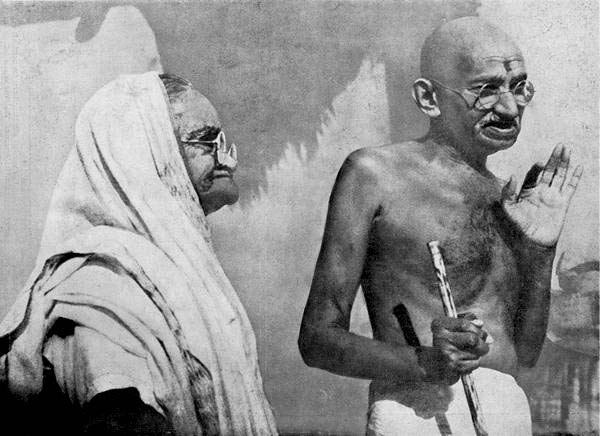
|
|
|
"Un
genitore saggio lascia che i figli commettano errori. È bene che una
volta ogni tanto si brucino le dita."
"A
wise parent leaves that his children commit errors. It is well that once
every so often they burn the fingers."
"Un
padre sabio deja que los hijos cometan errores. Es
bien que de vez en cuando se quemen los dedos."
"Un
parent sage laisse que les fils commettent fautes. Il est bien que de
temps en temps une fois ils les brûlent les doigts."
|
|
| .
.
. |
|
|
|
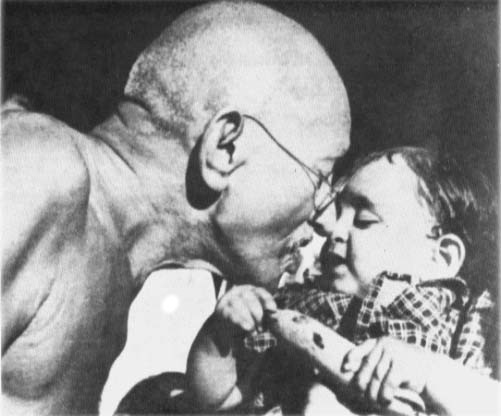
|
|
|
"Un'onesta
divergenza è spesso segno della salute del progresso."
“A
honest divergence is often sign of the health of the progress.”
"Una
honesta divergencia a menudo es señal de la salud del progreso."
"Une
divergence honnête est souvent signe de la santé du progrès."
|
|
| .
.
. |
|
|
|
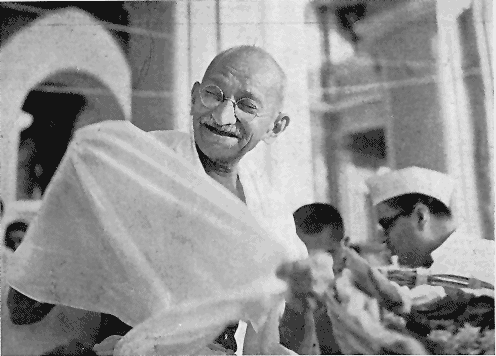
|
|
|
"Apprendere
che nella battaglia della vita si può facilmente vincere l'odio con
l'amore, la menzogna con la verità, la violenza con l'abnegazione
dovrebbe essere un elemento fondamentale nell'educazione di un bambino."
"To
learn that in the battle of the life he can easily win the hate with the
love, the lie with the truth, the violence with the abnegation should be
a fundamental element in the education of a child."
"Aprender que en la batalla de la vida
se puede vencer fácilmente el odio con el amor, la mentira con la
verdad, la violencia con la abnegación debería ser un elemento
fundamental en la educación de un niño."
"Apprendre
que dans la bataille de la vie on peut gagner la haine aisément avec
l'amour, le mensonge avec la vérité, la violence avec l'abnégation
devrait être un élément fondamental dans l'éducation d'un enfant."
|
|
| .
.
. |
|
|
|
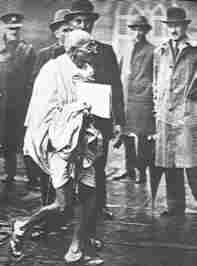
|
|
|
"Dobbiamo
diventare il cambiamento che vogliamo vedere."
"We
have to become the change that we want to see."
"Tenemos que convertirse en
el cambio que queremos ver."
"Nous
devons devenir le changement qui voulons voir." |
|
| .
.
. |
|
|
|
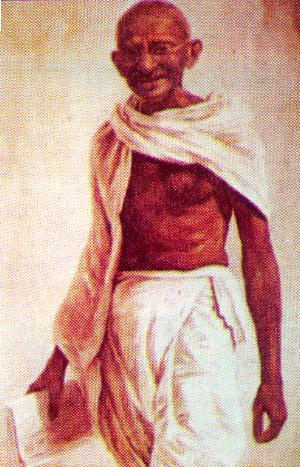
|
|
|
"È
meglio confessare i propri errori: ci si ritrova più forti."
"It
is better to confess his own errors: it finds again him stronger."
"Es
mejor confesar los mismos errores: se encuentra más fuertes."
"Il
vaut mieux avouer les propres fautes: il se retrouve y plus forts."
|
|
| .
.
. |
|
|
|
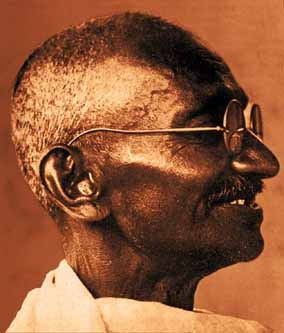
|
|
|
"Il
mezzo può essere paragonato a un seme, il fine a un albero; e tra mezzo
e fine vi è esattamente lo stesso inviolabile nesso che c'è tra seme e
albero."
(cioè: non c’è pace tramite la
guerra)
"The
mean can be compared to a seed, the goal to a tree; and between mean and
end there is exactly the same inviolable connection that there is
between seed and tree."
"El medio puede ser comparado con una
semilla, el objetivo a un árbol; y entre medio y fin hay exactamente el
mismo inviolable nexo que hay entre semilla y árbol."
"Le
demi peut être comparé à une graine, le but à un arbre; et entre
demi et fin il y a exactement le même rapport inviolable qu'il y a
entre graine et arbre."
|
|
| .
.
. |
|
|
|
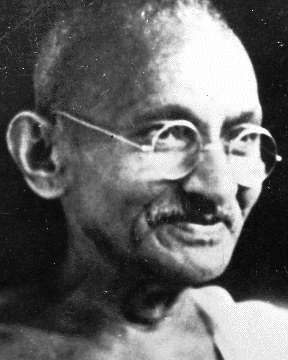
|
|
|
"Il
perdono è la qualità del coraggioso, non del codardo."
"Pardon
is the quality of the brave one, not of the coward." "El
perdón es la calidad de lo atrevido, no del cobarde." "Le
pardon est la qualité du courageux, pas du couard."
|
|
| .
.
. |
|
|
|
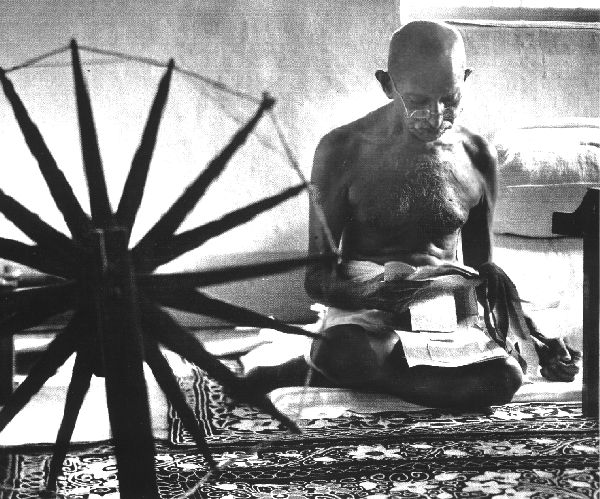
|
|
|
"Qualsiasi
cosa tu faccia sarà insignificante, ma è molto importante che tu la
faccia."
"Anything
you do it will be meaningless, but it is very important that you the
face."
"Cualquier
cosa tú hagas será insignificante, pero es muy importante que tú la
cara."
"Que
quoi tu fasses il sera insignifiant, mais il est très important que tu
la figure." |
|
| .
.
. |
|
|
|
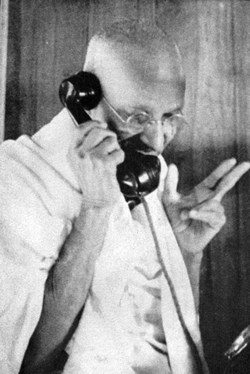
|
|
|
"La
verità non è mai stata rivendicata con la violenza."
"Truth
has never been vindicated with the violence."
"La verdad no ha sido
reivindicada nunca con la violencia."
"La
vérité n'a jamais été revendiquée avec la violence."
|
|
| .
.
. |
|
|
|
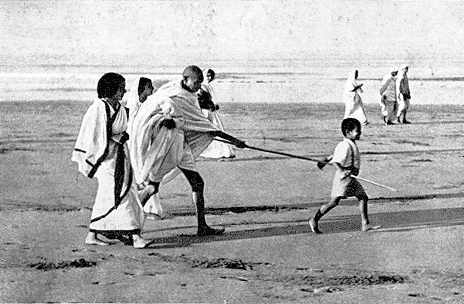
|
|
|
"La
nonviolenza è il primo articolo della mia fede e l’ultimo del mio
credo."
"The
not violence is the first article of my faith and the last of mine I
believe." "El
no violencia es el primero artículo de mi fe y él último del mío
creo." "Vous
pas violence est l'article premier de ma foi et le dernier du mien je
crois." |
|
| .
.
. |
|
|
|
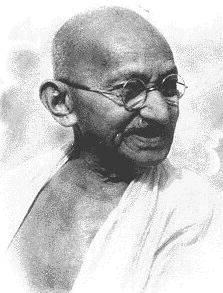
|
|
|
"Sono
un incorreggibile ottimista. Il mio ottimismo si fonda sulla
mia convinzione che ogni individuo ha infinite possibilità di
sviluppare la nonviolenza. Più l’individuo la sviluppa, più essa si
diffonderà come un contagio che a poco a poco contaminerà tutto il
mondo."
"I
am an incorrigible optimist. My optimism founds him upon my conviction
that every individual has endless possibilities to develop her/it not
violence. The individual develops anymore her, more it will spread as a
contagion that little by little you/he/she will contaminate the whole
world."
"Soy
un incorregible optimista. Mi optimismo se basa en mi convicción que
cada individuo tiene infinitas posibilidades de desarrollarla no
violencia. Más el individuo la desarrolla, más ella se difundirá como
un contagio que poco a la vez contaminará todo el mundo."
"Ce
sont un optimiste incorrigible. Mon optimisme se fonde sur ma conviction
que chaque individu a possibilités infinies de lui développer pas
violence. L'individu la développe plus, plus elle se répandra comme
une contagion qu'il contaminera tout le monde peu à peu." |
|
| .
.
. |
|
|
|
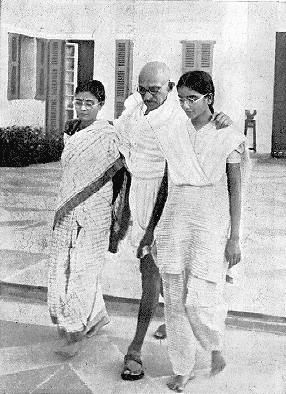
|
|
|
"Non
c’è liberazione per alcuno su questa terra, né per tutta la gente di
questa terra, se non attraverso la verità e la nonviolenza, in ogni
cammino della vita, senza eccezione."
"There
is no liberation for some on this earth, neither for all the people of
this earth, if not through the truth and her not violence, in every walk
of the life, without exception."
"No
hay liberación por alguno sobre esta tierra, ni por toda la gente de
esta tierra, si no por la verdad y ella no violencia, en cada camino de
la vida, sin excepción."
"Il
y n'a pas libération pour quelque sur cette terre, ni pour tous la gens
de cette terre, si pas à travers la vérité et elle pas violence, en
chaque chemin de la vie, sans exception."
|
|
| .
.
. |
|
|
|

|
|
|
"La
mia vita è il mio messaggio."
"My
life is my message."
"Mi
vida es mi mensaje."
"Ma
vie est mon message." |
|
| .
.
. |
|
|
|
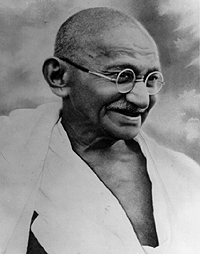
|
|
|
"La
vera moralità non consiste nel seguire il sentiero battuto, ma nel
cercare ciascuno la propria strada e nel seguirla senza esitazioni."
"True
morality doesn't consist of following the beaten path, but in to look
for every his/her own road and in to follow her/it without hesitations."
"La verdadera moralidad no consiste en
seguir la senda batido, pero en buscar cada uno la misma calle y en
seguirla sin indecisiones."
"La
vraie moralité ne consiste pas à suivre le sentier battu, mais en le
chercher chaque la propre rue et en le la suivre sans hésitations."
|
|
| .
.
. |
|
|
|
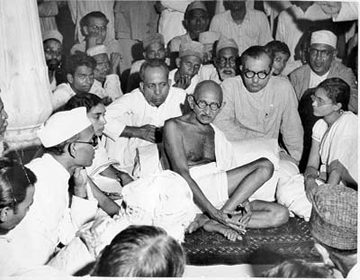
|
|
|
"L’amore
non conosce mai la paura."
"The
love never knows the fear."
"El
amor no conoce nunca el miedo."
"L'amour
ne connaît jamais la peur." |
|
| .
.
. |
|
|
|
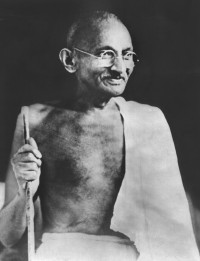
|
|
|
"Per
riuscire a vedere faccia a faccia lo Spirito della verità, universale e
onnipresente, bisogna riuscire ad amare la più modesta creatura quanto
noi stessi. E un uomo che nutre questa aspirazione non può esimersi dal
partecipare a nessun aspetto della vita, ecco perché la mia adorazione
per la Verità mi ha portato ad interessarmi anche di politica; posso
affermare senza la minima esitazione, sebbene con molta umiltà, che
coloro che sostengono che la religione non c'entra con la politica,
ignorano cosa sia la politica.
L'errore
non può pretendere alcuna immunità anche se è sostenuto dalle. sacre
scritture del mondo."
"To
succeed in seeing confrontation the Spirit of the truth, universal and
omnipresent, it needs to succeed in loving the most modest creature how
much ourselves. And a man that nourishes this aspiration cannot refuse
to participate in any aspect of the life, that's why my adoration for
the Truth has brought me to also interest me of politics; I can affirm
without the least hesitation, although with a lot of humility, that
those people whom sustain that the religion doesn't have anything to do
with it with the politics, they ignore what both the politics.
The
error cannot pretend any immunity even if you/he/she is sustained by
the. sacred writings of the world."
"Para
lograr ver cara a haga el Espíritu de la verdad, universal y
omnipresente, hace falta lograr querer la más modesta criatura cuánto
nosotros mismos. Y un hombre que nutre esta aspiración no puede
eximirse del participar en ningún aspecto de la vida, he aquí porque
mi adoración por la Verdad me ha llevado a también interesarme de política;
puedo afirmar sin la mínima indecisión, aunque con mucha humildad, que
los que sustentan que la religión no entra allí con la política,
ignoran cosa sea la política.
El
error no puede pretender alguna inmunidad aunque es sustentado por los.
sagradas escrituras del mundo."
"Pour
réussir à voir l'Esprit de la vérité face à face, universel et
omniprésente, il faut réussir à aimer créature la plus modeste
combien nous mêmes. Et un homme qu'il nourrit cette aspiration il ne
peut pas s'exempter du participer à l'aucun aspect de la vie, voilà
parce que mon adoration pour la Vérité m'a apporté à m'intéresser
aussi de politique; je peux affirmer sans la moindre hésitation,
quoique avec beaucoup d'humilité que ceux qui soutiennent que la
religion n'entre pas y avec la politique, ils ignorent que soit la
politique.
La
faute ne peut pas exiger quelque exemption même s'il est soutenu par
elle. écritures sacrées du monde."
|
|
| .
.
. |
|
|
|
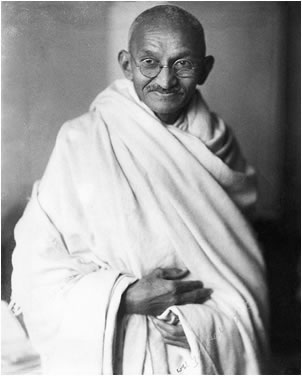
|
|
|
"Lo scopo dell'uomo è la
realizzazione di Dio e tutte le sue attività, politiche, sociali,
religiose, devono essere dirette dallo scopo ultimo della visione di
Dio."
"The purpose of the man is the realization of
God and all of its activities, politics, social, religious, they have to
be direct from the last purpose of the vision of God."
"El
objetivo del hombre es la realización de Dios y todas sus actividades,
políticas, sociales, religiosas, tienen que ser dirigidas por el
objetivo último de la visión de Dios."
"Le but de l'homme est
la réalisation de Dieu et toutes ses activité, politique, sociaux,
religieuses doivent être dirigées par le but dernier de la vision de
Dieu."
|
|
| .
.
. |
|
|
|
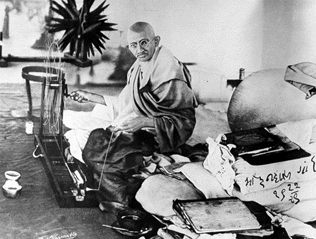
|
|
|
"Dobbiamo odiare il peccato,
non il peccatore."
"We have to hate the
sin not the sinner."
"Tenemos que odiar el
pecado, no el pecador."
"Nous
devons haïr le péché pas le pécheur." |
|
| .
.
. |
|
|
|
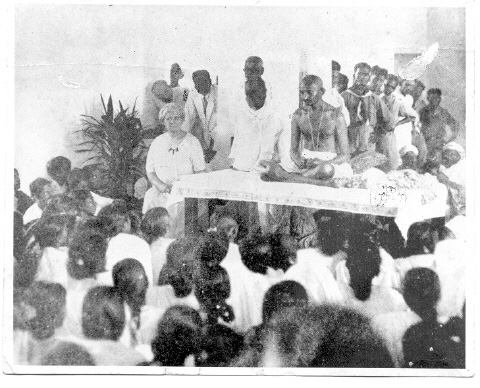
|
|
|
"Non voglio la libertà
dell'India se essa deve significare l'estinzione dell'Inghilterra o la
scomparsa degli inglesi. Voglio la libertà del mio paese affinché
altri paesi possano imparare qualcosa dal mio libero paese."
"I don't want the
liberty of India if it has to mean the extinction of England or the
disappearance of the English. I want the liberty of my country so that
other countries can learn something from my free country."
"No
quiero la libertad de la India si ella tiene que significar la extinción
de Inglaterra o la desaparición de los ingleses. Quiero la libertad de
mi país para que otros países puedan aprender algo de mi libre país."
"Je
ne veux pas la liberté de l'Inde si elle doit signifier l'extinction de
l'Angleterre ou la disparition des Anglais. Je veux la liberté de mon
pays pour qu'autres pays puissent apprendre quelque chose de mon pays
libre."
|
|
| .
.
. |
|
|
|
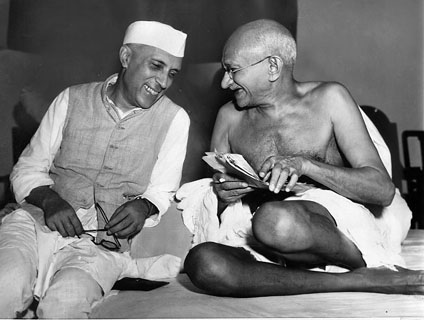
|
|
|
"Mi sforzo di vedere Dio
attraverso il servizio dell'umanità, perché so che Dio non è in cielo
né quaggiù, ma in ciascuno di noi."
"I strive me to
see God through the service of the humanity, because I know that God is
not in sky neither down here, but in every of us."
"Me esfuerzo de ver Dios
atravieso el servicio de la humanidad, porque sé que Dios no está en
cielo ni aquí abajo, pero en cada uno de nosotros."
"Je
m'efforce de voir Dieu je traverse le service de l'humanité, parce que
je sais que Dieu n'est pas en ciel ni ici, mais en chaque de nous."
|
|
| .
.
. |
|
|
|
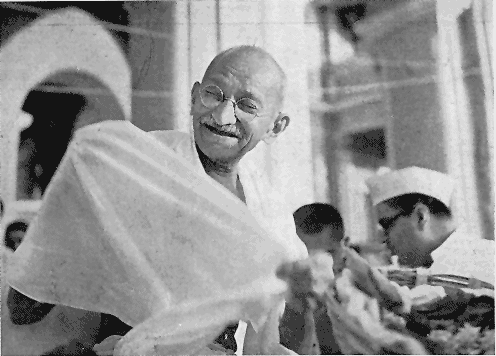
|
|
|
(riguardo le diverse religioni)
"Che importanza ha quindi se prendiamo strade diverse purché alla fine
giungiamo alla stessa meta?"
"What importance
does it have therefore if we take different roads provided that at the
end we reach the same destination?"
"Qué
importancia tiene por lo tanto si tomamos calles diferentes conque al
final llegamos a la misma meta?"
"Qu'importance
il a donc si nous prenons rues différentes pourvu qu'à la fin nous
joignons à la même destination?"
|
|
| .
.
. |
|
|
|
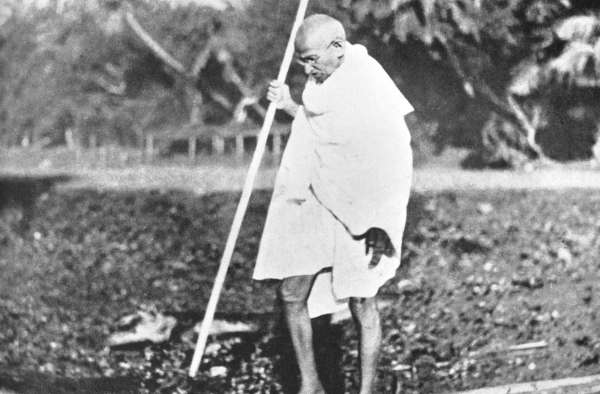
|
|
|
"Un'onesta
divergenza è spesso segno della salute del progresso."
"A honest divergence
is often sign of the health of the progress."
"Una honesta divergencia
a menudo es señal de la salud del progreso"
"Une
divergence honnête est souvent signe de la santé du progrès." |
|
| .
.
. |
|
|
|
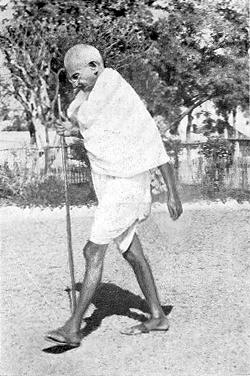
|
|
|
"Apprendere che
nella battaglia della vita si può facilmente vincere l'odio con
l'amore, la menzogna con la verità, la violenza con l'abnegazione
dovrebbe essere un elemento fondamentale nell'educazione di un bambino."
"To
learn that in the battle of the life he can easily win the hate with the
love, the lie with the truth, the violence with the abnegation should be
a fundamental element in the education of a child."
"Aprender
que en la batalla de la vida se puede vencer fácilmente el odio con el
amor, la mentira con la verdad, la violencia con la abnegación debería
ser un elemento fundamental en la educación de un niño."
"Apprendre
que dans la bataille de la vie on peut gagner la haine aisément avec
l'amour, le mensonge avec la vérité, la violence avec l'abnégation
devrait être un élément fondamental dans l'éducation d'un enfant."
|
|
| .
.
. |
|
|
|
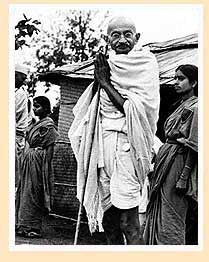
|
|
|
"Dobbiamo
diventare il cambiamento che vogliamo vedere."
"We
have to become the change that we want to see."
"Tenemos que convertirse
en el cambio que queremos ver."
"Nous
devons devenir le changement qui voulons voir." |
|
| .
.
. |
|
|
|
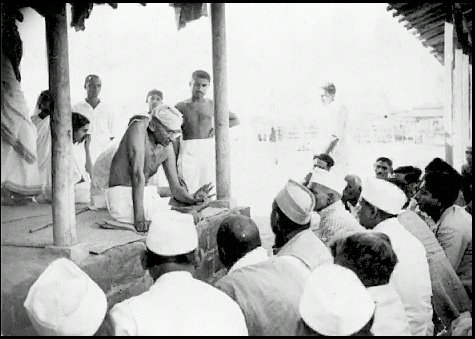
|
|
|
"Non
ho nulla di nuovo da insegnare al mondo. La verità e la non violenza
sono antiche come le montagne."
"I don't have
again anything to teach to the world. The truth and her not violence
they are ancient as the mountains."
"No tengo
que nada nuevo enseñar al mundo. La verdad y ella no violencia son
antiguas como las montañas."
"Je
n'ai rien de nouveau à enseigner au monde. La vérité et elle pas
violence est ancienne comme les montagnes."
|
|
| .
.
. |
|
|
|
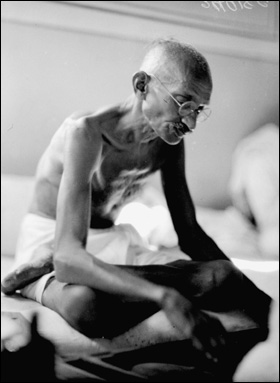
|
|
|
"In
democrazia nessun fatto di vita si sottrae alla politica."
"In democracy any
fact of life escapes to the politics."
"En democracia ningún
hecho de vida se sustrae a la política."
"En
démocratie aucun fait de vie ne se dérobe à la politique." |
|
| .
.
. |
|
|
|
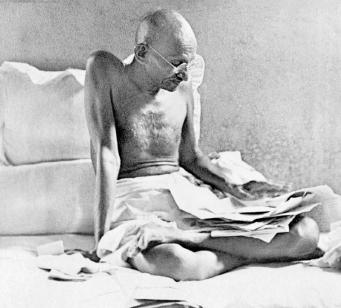
|
|
|
"Percepisco
oscuramente che mentre tutto attorno a me muta e si muove sempre, sotto
tutti questi mutamenti vi è una forza vivente, immutabile, che tiene
tutto assieme, crea, dissolve e ricrea. Questa forza o spirito
informatore è Dio."
"I obscurely
perceive that while everything around me changes and it always stirs,
under all these changes there is a living strength, unchangeable, that
holds together everything, it creates, it dissolves and it recreates.
This strength or spirit informant is God."
"Percibo
obscuramente que mientras todo alrededor de mí muda y siempre se mueve,
bajo todos este cambios hay una fuerza viviente, inmutable, que tiene
junto todo, crea, disuelve y recrea. Esta fuerza o espíritu informador
es Dios."
"Je
perçois obscurément que pendant que tout autour de moi meute et il se
remue toujours, sous tous ces changements il y a une force vivante,
immuable, qu'il tient tout ensemble, il crée, il dissout et il récrée.
Cette force ou esprit animateur il est Dieu."
|
|
|
|
|
|
|
|
|
|
|
|
|
|
|
|
|
|
|
|
|
|
|
|
|
|
|
|
|
|
|
|
|
|
|
|
|
|
|
|
|
|
 |
|
|
|
|